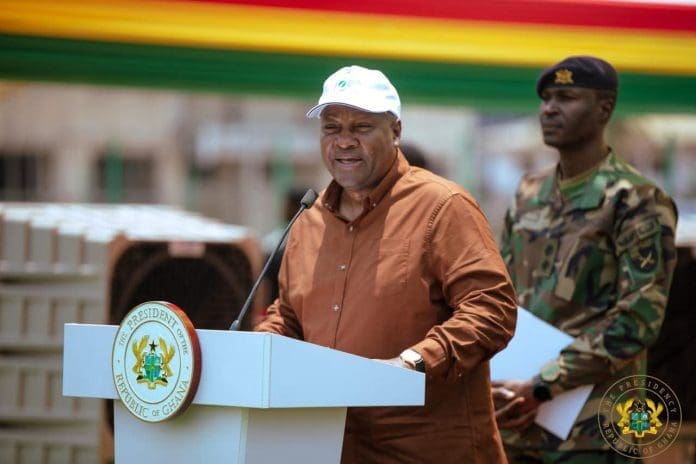President John Dramani Mahama has relaunched the National Sanitation Day (NSD), reviving a nationwide cleanup campaign aimed at tackling Ghana’s sanitation challenges and promoting a culture of cleanliness across communities.
The event, held at the Institute of Local Government Studies (ILGS) in Madina, brought together government officials, traditional rulers, religious leaders, students, civil society, and development partners.
President Mahama described environmental sanitation as “fundamental to public health, education, and tourism” and a crucial driver of socio-economic development.
He noted that despite Ghana’s progress, unsanitary conditions continue to fuel disease outbreaks, degrade the environment, and hinder national growth.
“The National Sanitation Day is a call to action; an opportunity for each of us, regardless of political affiliation, social standing, or religious belief, to unite in keeping our surroundings clean,” the President said.
The NSD, first introduced under his administration in 2014, will now be observed nationwide on the first Saturday of every month. Activities will include desilting of gutters, clearing of refuse, and weeding public spaces, with broad participation expected from households, schools, churches, businesses, and local assemblies.
Objectives and Benefits
The President outlined key objectives of the campaign:
- Raising awareness and fostering community-led participation.
- Building a culture of routine cleaning and maintenance.
- Improving public health by breaking cycles of disease transmission.
- Boosting tourism and attracting investors through a cleaner national image.
He further announced plans to introduce a “Cleanest City Award” to encourage healthy competition among Metropolitan, Municipal, and District Assemblies (MMDAs).
Beyond sanitation, President Mahama linked the initiative to his government’s wider “Resetting Ghana Agenda,” which includes new investments in modern waste management systems, youth-led waste entrepreneurship, and afforestation programmes such as Tree for Life Restoration.
He also cited the Blue Water River Guards initiative, expected to train 2,000 young people to protect Ghana’s rivers from illegal mining.
Ministry’s Accountability Framework
Minister for Local Government, Chieftaincy, and Religious Affairs, Hon. Ahmed Ibrahim, emphasized that the relaunch represents a renewed social contract between government and citizens.
Ahmed Ibrahim said the relaunch represented a renewed social contract between government and citizens, anchored on accountability, enforcement, and sustainability.
He noted that Ghana’s sanitation failures—ranging from indiscriminate waste disposal and poor drainage management to weak enforcement of by-laws—have led to frequent outbreaks of cholera, malaria, and other deadly diseases, alongside flooding and economic losses.
“The NSD is not just a cleanup exercise; it is about restoring discipline and pride in public spaces,” the Minister emphasized.
He revealed that sanitation has now been made a key performance indicator (KPI) for Metropolitan, Municipal and District Chief Executives (MMDCEs), making local assemblies directly accountable for sustainable cleanliness.
To strengthen oversight, the Ministry announced additional accountability measures, including the establishment of a dedicated sanitation hotline for citizens to report public health nuisances, a central dashboard to track responses and performance, and mandatory monthly sanitation reports from assemblies.
The Minister urged traditional authorities, religious leaders, youth groups, and the media to mobilize their constituencies for active participation, noting that sustainable sanitation “is a shared responsibility that requires consistent and collective action.”
He announced new accountability measures, including:
- A dedicated sanitation hotline for citizens to report nuisances.
- A central monitoring dashboard to track assembly performance.
- Mandatory monthly sanitation reports from assemblies to Regional Coordinating Councils.
“Environmental sanitation is a shared responsibility. The success of this initiative hinges on the active participation of all Ghanaians,” the Minister stressed.
Stakeholder Roles
Both the President and the Minister appealed to traditional and religious leaders to use their influence to mobilize citizens, while urging the youth to lead the charge with energy and creativity.
The media was also charged to raise awareness, highlight challenges, and celebrate community successes.
National Call
Reiterating his commitment, President Mahama declared:
“We are not just cleaning our environment; we are securing the health of our people, protecting our environment, and leaving a legacy for generations to come. Let us make the National Sanitation Day a true celebration of our commitment to a cleaner, healthier, and more sustainable Ghana.”
The relaunch signals a new phase in Ghana’s sanitation drive, with monthly nationwide exercises set to begin next Saturday.
Source: newsghana.com.gh











